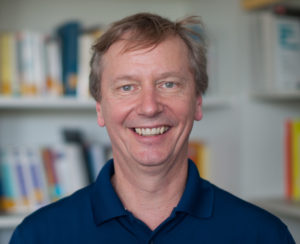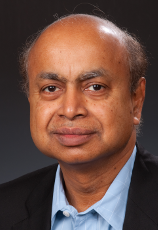Keynote 1: 6G – A True Step Beyond 5G
Monday, July 13 2020 10:00 ET
Gerhard P. Fettweis, TU Dresden
Abstract
The initial vision of cellular communications was to deliver ubiquitous voice communications to anyone anywhere. However, only 2G delivered this promise. It also initiated the appetite for cellular data, for which 3G was designed. However, we needed 4G to deliver energy efficient broadband cellular data. With 5G the promise is to start the Tactile Internet, controlling real and virtual objects in real-time via cellular. It seems, that we need to stretch 5G to the next step, 6G. We seem to need 2 generations to bring a new service to fruition, with odd generations initiating and even ones making it happen. The physical air interface also has 2 generations of technology ripening, however even ones initiating it and odd completing it (CDMA: 2G and 3G, OFDM: 4G and 5G).
If generations stay the same, we are ready for a revolution in air interface to happen with 6G, to “stretch the goals of 5” such that 6G can deliver the promises made. However, here we will also show new opportunities ahead, going far beyond stretching goals, as e.g. increasing data rate and reducing latency. With some first experimental results, this talk shall deliver a vision as well as some validation of what could become possible.
In particular we will discuss using the physical layer also for sensing, expanding the current focus of cellular one big step forward. Also, the current cellular network comprising 2 basic functions, i.e. service delivery via layer 1-7, and network management, must be expanded by adding a third layer for delivering integrity. Finally, today’s data traffic is dominated by video delivery. Will this stay that way?
Biography
 Gerhard P. Fettweis F’09, is Vodafone Chair Professor at TU Dresden since 1994, and heads the Barkhausen Institute since 2018, respectively. He earned his Ph.D. under H. Meyr’s supervision from RWTH Aachen in 1990. After one year at IBM Research in San Jose, CA, he moved to TCSI Inc., Berkeley, CA. He coordinates the 5G Lab Germany, and has coordinated 2 German Science Foundation (DFG) centers at TU Dresden, namely cfaed and HAEC. In 2019 he was elected into the DFG Senate. His research focusses on wireless transmission and chip design for wireless/IoT platforms, with 20 companies from Asia/Europe/US sponsoring his research. He also serves on the board of National Instruments Corp, and advises other companies.
Gerhard P. Fettweis F’09, is Vodafone Chair Professor at TU Dresden since 1994, and heads the Barkhausen Institute since 2018, respectively. He earned his Ph.D. under H. Meyr’s supervision from RWTH Aachen in 1990. After one year at IBM Research in San Jose, CA, he moved to TCSI Inc., Berkeley, CA. He coordinates the 5G Lab Germany, and has coordinated 2 German Science Foundation (DFG) centers at TU Dresden, namely cfaed and HAEC. In 2019 he was elected into the DFG Senate. His research focusses on wireless transmission and chip design for wireless/IoT platforms, with 20 companies from Asia/Europe/US sponsoring his research. He also serves on the board of National Instruments Corp, and advises other companies.
Gerhard is IEEE Fellow, member of the German Academy of Sciences (Leopoldina), the German Academy of Engineering (acatech), and received multiple IEEE recognitions as well has the VDE ring of honor. In Dresden his team has spun-out eighteen tech start-ups, and setup funded projects in volume of close to EUR 1/2 billion. He co-chairs the IEEE 5G/Future Networks Initiative, and has helped organizing IEEE conferences, most notably as TPC Chair of ICC 2009 and of TTM 2012, and as General Chair of VTC Spring 2013 and DATE 2014.
Keynote 2: Achieving Low Latency Mobile Edge Cloud Services in Next-Generation Wireless Networks
Tuesday, July 14 2020 10:00 ET
Dipankar Raychaudhuri, Rutgers University
Abstract
Next generation wireless access networks (5G and beyond) are being designed to support mobile edge cloud services with tight latency constraints. In this talk, we consider the design challenges of realizing low latency applications in edge-cloud enhanced B5G networks, starting with an identification of bottlenecks associated with current technologies. An end-to-end approach for latency reduction is proposed via improvements to the radio access layer, the core network architecture and the edge cloud subsystem. Specific techniques for reducing latency are discussed and evaluated, including optimization of the coding and MAC framing, redesign of the mobile core network with fast optical technology and elimination of centralized gateways, virtual network protocols with application aware routing, and real-time scheduling and orchestration of cloud tasks. The talk concludes with a brief overview of the COSMOS testbed currently being deployed in New York City for the purpose of supporting experimental research on emerging edge-cloud enhanced wireless systems.
Biography
Dipankar Raychaudhuri is Distinguished Professor, Electrical & Computer Engineering and Director, WINLAB (Wireless Information Network Lab) at Rutgers University. As WINLAB’s Director, he is responsible for an internationally recognized industry-university research center specializing in wireless technology. He has served (or is serving) as principal investigator for several large U.S. National Science Foundation funded projects including the “ORBIT” wireless testbed, the “MobilityFirst” future Internet architecture, and the COSMOS city-scale platform for advanced wireless research.
Dr. Raychaudhuri has previously held corporate R&D positions including: Chief Scientist, Iospan Wireless (2000-01), Assistant General Manager & Department Head, NEC Laboratories (1993-99) and Head, Broadband Communications, Sarnoff Corp (1990-92). He obtained the B.Tech (Hons) from IIT Kharagpur in 1976 and the M.S. and Ph.D degrees from SUNY, Stony Brook in 1978, 79. He is a Fellow of the IEEE and the recipient of several professional awards including the Rutgers School of Engineering Faculty of the Year Award (2017), IEEE Donald J. Fink Award (2014), Indian Institute of Technology, Kharagpur, Distinguished Alumni Award (2012), and the Schwarzkopf Prize for Technological Innovation (2008).



